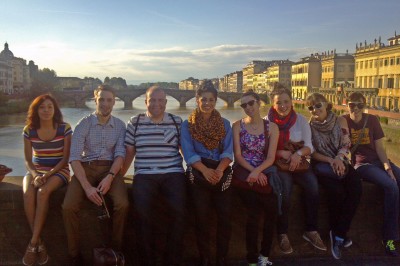Literature course explores Dante’s world in Italy
By Margo Fritz ’15
Cornell is known for its immersive courses, but it isn’t every block that students are immersed in Hell.
 Medieval Literature students spent Block 2 in Italy studying Dante’s “Divine Comedy,” an epic poem in three parts. The first part, “Inferno,” takes place in Dante’s famous representation of Hell.
Medieval Literature students spent Block 2 in Italy studying Dante’s “Divine Comedy,” an epic poem in three parts. The first part, “Inferno,” takes place in Dante’s famous representation of Hell.
The class stayed in Florence for two weeks, visited Pisa, Siena, and Monteriggioni, and ended with a short trip to Rome. Their days were spent exploring cathedrals and sites that inspired Dante himself and viewing art that was in turn inspired by Dante’s work.
“It felt like I was walking through the story in real life,” said senior Narda Aldaco. “I’m a wanderer at heart, and every corner, every alley, every shop, every inch of that city let my curiosity run wild—only sometimes tamed by gelato, depending on the weather.”
While in Florence, some classes were held in the beautiful Boboli Gardens, a park replete with grottos, garden temples, Roman antiques, and sculptures from the 16th through 18th centuries. Site visits in Florence included Palazzo Davanzati, the Accademia and the Uffizi galleries. In Rome the class visited the Colosseum, the Pantheon, the Sistine Chapel, Vatican museums, and St. Peter’s Basilica.
Throughout the block, all eight students maintained personal blogs that merged their experiences in Italy with Dante’s work. Each post displays the influence the course had on their understanding of literature, culture, history, and current events.
Cornell Professor of English Katy Stavreva, noted for her work on multidisciplinary approaches to teaching Dante, taught the course. Stavreva helped students develop artistic responses to short passages from Dante’s work. These pieces took the form of paintings, mock science experiments on Lucifer’s frozen flesh, poems, fantasy fiction, or whatever else students were inspired to create by their surroundings.
“This class was like an archaeological dig through culture,” said senior Charlie Taylor. “Everywhere we went we found another piece of the puzzle, something that helped us better understand Dante’s work. I never could have experienced Dante in this way without being in Italy.”
Blog posts from Italy
- Dominicans and Dante: The Weight of the Infernal Scale, by Charlie Taylor
- I Found Paradise in My Gelato, by Laurel Fraser
- A Master and a Pupil, by Mark Lerner
- Sodomy and Valor, by Meghan Kuhn
- Paradise—It’s the Small Things in Life, by Narda Aldaco
- The Journey, by Rachel Cowell
- Om Nom Nom Paganism, by Stephanie Campbell
- Bippity Boppity Boboli, by Veronica Desangles



